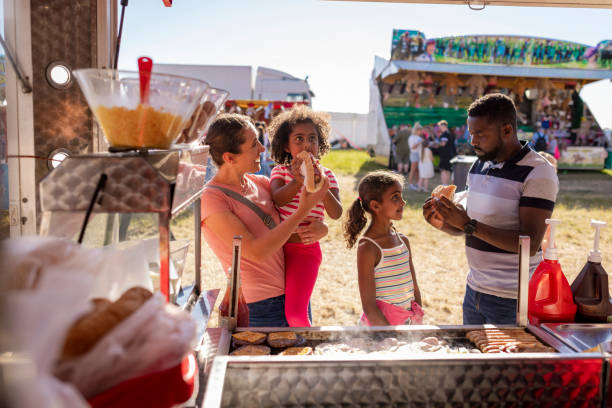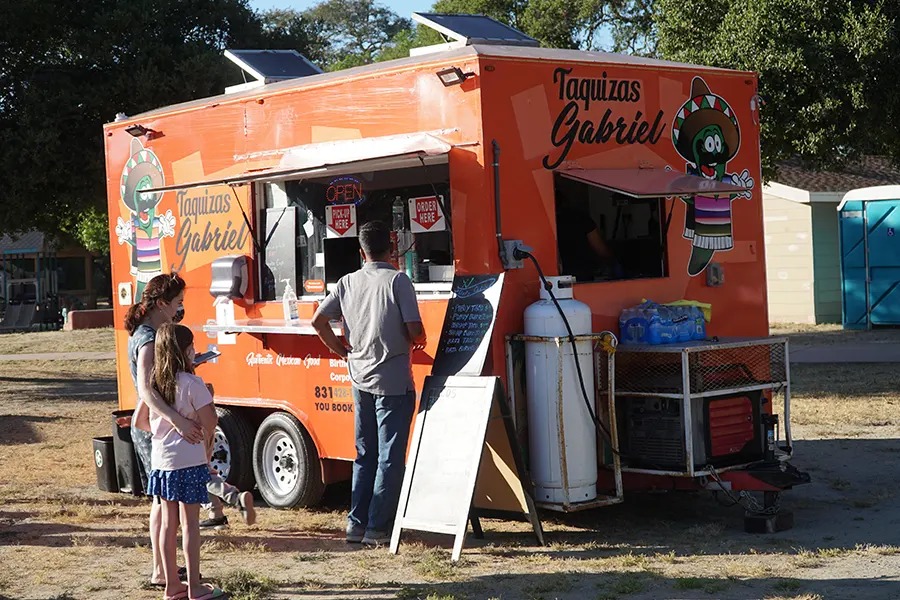Penser à démarrer votre propre entreprise de nourriture mobile? L'idée de naviguer en ville, Servir de délicieux repas aux clients affamés, Tout en gagnant un revenu solide, peut être super attrayant. Mais avant de prendre la route avec votre remorque ou votre camion de nourriture, Il y a beaucoup à comprendre. De quoi ai-je besoin pour démarrer une entreprise alimentaire mobile? De la recherche de la bonne remorque mobile à la mise en place de vos finances et de votre marketing, Le démarrage d'une entreprise alimentaire mobile nécessite une planification minutieuse et un peu d'agitation. Donc, Plongeons dans l'essentiel qui vous aidera à lancer une entreprise alimentaire mobile réussie.
Comprendre l'industrie alimentaire mobile

Qu'est-ce qu'une entreprise alimentaire mobile?
Une entreprise alimentaire mobile est exactement ce à quoi cela ressemble: une entreprise qui vend de la nourriture à un véhicule qui peut être conduit à différents endroits. Au lieu de compter sur un restaurant traditionnel de brique et de mortier, Une entreprise alimentaire mobile vous donne la liberté de prendre votre nourriture sur la route, Servir les clients dans divers domaines. Ce modèle d'entreprise a explosé en popularité ces dernières années, grâce à la flexibilité qu'il offre et à la demande croissante de, Expériences alimentaires en déplacement.
3 Types d'entreprises alimentaires mobiles
- Camions de nourriture: Ce sont les grands, Véhicules entièrement équipés que vous voyez souvent lors des festivals, parcs, ou coins de rue occupés. Un camion de restauration est une cuisine à grande échelle sur roues, vous permettant de servir une variété de plats à partir d'un seul endroit. Ils sont souvent l'option de référence pour les personnes qui démarrent une entreprise alimentaire mobile.
- Chariots de nourriture: Plus petit que les camions, Les chariots de nourriture sont généralement tirés à la main ou attachés à un véhicule. Ceux-ci sont parfaits pour servir des menus plus petits, comme le café, hot-dogs, ou tacos, et sont généralement moins chers à commencer qu'un camion à part entière.
- Remorques alimentaires: Remorques alimentaires sont similaires aux camions de nourriture mais sont remorqués par un autre véhicule. Ils offrent plus d'espace qu'un chariot alimentaire mais peuvent être un peu plus limités en mobilité. Ils sont parfaits pour les entrepreneurs à la recherche d'un peu plus d'espace pour étendre leur menu et sont souvent vus dans les foires ou en tant que partie des parcs de camions de restauration.
Créer un plan d'affaires
Définir votre concept et votre menu
Avant même de penser à choisir une remorque mobile personnalisée ou un camion de nourriture mobile, Nouer votre concept. Quel type de nourriture voulez-vous servir? Allez-vous pour des hamburgers gastronomiques, enveloppements végétaliens, ou Tacos de style rue? Votre concept définira votre menu et donnera le ton à votre entreprise. Gardez à l'esprit que votre menu doit être gérable dans une cuisine mobile, alors concentrez-vous sur les plats faciles à préparer et à servir à partir d'un petit espace.
Analyse du marché cible et de l'emplacement
Suivant, Considérez où sont vos clients cibles. Votre nourriture est-elle destinée aux familles, employés de bureau, Ou les fêtards de fin de soirée? Vos emplacements idéaux dépendront de votre marché cible. Vous devrez repérer des zones à haut trafic piétonnier, comme les parcs de camions de restauration, fêtes, ou près des immeubles de bureau. Plus votre emplacement est stratégique, Plus vos chances de succès sont élevées.
Planification financière et budgétisation
Démarrer un entreprise de restauration mobile Livré avec un prix élevé. Les coûts incluront votre véhicule (camion de restauration, chariot, ou remorque), équipement de cuisine, permettre, et les ingrédients. La budgétisation est cruciale - n'oubliez pas d'inclure des coûts cachés comme la maintenance, assurance, et salaire des employés. Fixez des objectifs de revenus réalistes en fonction de vos études de marché, et assurez-vous de tenir compte de toutes les dépenses lors de la tarification de votre menu.
Licences communes pour l'activité de remorque alimentaire
Les licences et permis nécessaires à une remorque alimentaire dans une entreprise alimentaire mobile dépendent de votre emplacement, le type de nourriture que vous prévoyez de servir, et réglementations locales. Voici un guide général des exigences les plus courantes:
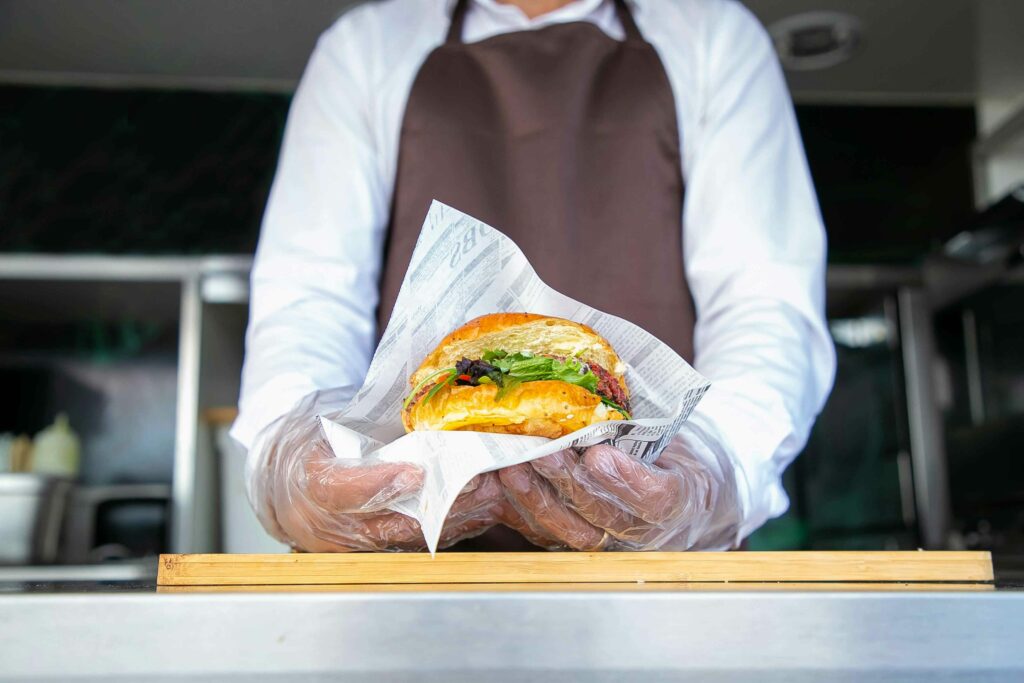
1. Licence commerciale
- Ce que c'est: Une licence de base pour exploiter légalement une entreprise dans votre région.
- Où l'obtenir: Gouvernement local ou hôtel de ville.
- Pourquoi c'est nécessaire: Établit votre entreprise en tant qu'entité légitime.
2. Permis de nourriture
- Ce que c'est: Autorisation de préparer et de servir de la nourriture.
- Où l'obtenir: Service de santé local.
- Exigences: Passer une inspection pour la santé de votre remorque alimentaire et des pratiques de préparation des aliments.
3. Permis de fournisseur mobile
- Ce que c'est: Un permis spécifiquement pour les entreprises alimentaires mobiles.
- Où l'obtenir: Bureaux municipaux ou comtés locaux.
- Pourquoi c'est nécessaire: S'assure que vous êtes autorisé à vendre de la nourriture dans des domaines publics ou spécifiques.
4. Permis / certification du gestionnaire des aliments
- Ce que c'est: Une certification montrant que vous comprenez les pratiques de sécurité alimentaire.
- Où l'obtenir: Cours en ligne accrédités ou services de santé locaux.
- Qui en a besoin: Tous les employés manipulent de la nourriture.
5. Certificat de sécurité incendie
- Ce que c'est: Approbation du service d'incendie que votre remorque répond aux normes de sécurité incendie.
- Où l'obtenir: Le bureau du maréchal d'incendie local.
- Exigences: Inspection de l'équipement de cuisson, extincteurs, et systèmes de ventilation.
6. Enregistrement et assurance des véhicules
- Ce que c'est: Enregistrement pour la remorque et assurance pour la responsabilité et les dommages matériels.
- Où l'obtenir: Département des véhicules automobiles (DMV) et assureurs.
- Pourquoi c'est nécessaire: Couvre les accidents et autres risques associés à l'exploitation d'une unité mobile.
7. Permis de taxe de vente
- Ce que c'est: Autorisation de percevoir et de remettre la taxe de vente sur les ventes de nourriture.
- Où l'obtenir: Autorité fiscale de l'État.
- Pourquoi c'est nécessaire: Requis pour la conformité à l'impôt juridique.
8. Permis de zonage local
- Ce que c'est: Autorisation de fonctionner dans des zones ou des emplacements spécifiques.
- Où l'obtenir: Département de zonage de la ville ou du comté.
- Pourquoi c'est nécessaire: Certaines zones ont des restrictions sur les opérations alimentaires mobiles.
9. Accord de commissaire
- Ce que c'est: Documentation montrant que vous avez accès à une cuisine agréée pour la préparation des aliments et le stockage.
- Où l'obtenir: Partenariat avec une cuisine de commissaire locale ou une installation similaire.
- Pourquoi c'est nécessaire: De nombreuses zones exigent que les remorques alimentaires soient affiliées à une cuisine agréée.
10. Permis d'événement spécial (Facultatif)
- Ce que c'est: Permis temporaires pour opérer lors d'événements comme les foires ou les festivals.
- Où l'obtenir: Organisateurs d'événements ou autorités locales.
- Pourquoi c'est nécessaire: Spécifique aux opérations à court terme.
Conseils pour la conformité:
- Recherchez les lois locales: Les exigences de la licence de bande-annonce mobile varient considérablement selon la ville, comté, et indiquer.
- Consulter les services de santé: Ils sont une ressource clé pour comprendre les règles de sécurité alimentaire et de licence.
- Gardez les permis à jour: Renouveler les licences et les permis au besoin pour éviter les pénalités.
Choisir le bon véhicule alimentaire mobile
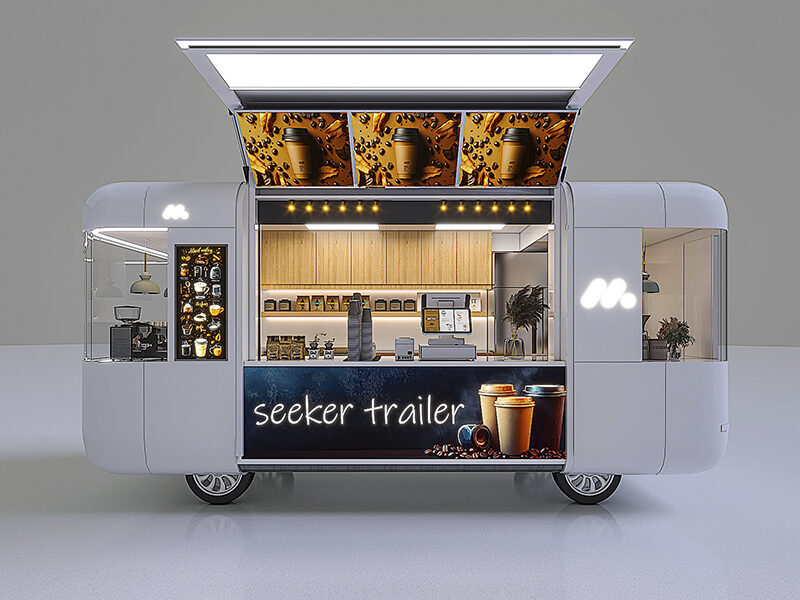
Food Truck vs. Remorque alimentaire vs. Chariot
Choisir le bon véhicule parmi fabricants fiables car votre entreprise est une décision majeure.
- Un camion de restauration vous offre plus de flexibilité mais est généralement plus cher à acheter et à maintenir.
- Une remorque alimentaire, Bien que plus abordable, peut limiter votre capacité à se déplacer rapidement entre les endroits.
- Un chariot alimentaire est l'option la moins chère mais est également livré avec ses propres limitations en termes de ce que vous pouvez servir et où vous pouvez aller.
Facteurs à considérer lors du choix de votre véhicule
En regardant autour du processus de fabrication de remorques alimentaires dans l'usine peut vous aider à en savoir plus sur la façon de choisir votre véhicule.
- Taille et disposition L'espace est essentiel. Vous avez besoin de suffisamment de place pour stocker vos ingrédients, équipement, et l'espace pour que votre personnel travaille efficacement. La disposition de votre véhicule devrait faciliter l'accès à l'équipement de cuisson, stockage, et les zones de service.
- Besoins en équipement Selon votre menu, Vous pourriez avoir besoin d'équipement spécial, comme les grils, friteuses, ou unités de réfrigération. Assurez-vous que le véhicule que vous choisissez peut s'adapter à ces.
- Considérations budgétaires Lors du démarrage d'une entreprise de remorque de concession, L'abordabilité est souvent en tête. Recherchez des remorques alimentaires abordables qui répondent toujours à vos besoins en termes d'espace, équipement, et durabilité.
Équipement de votre véhicule alimentaire mobile
Équipement de cuisine essentiel
Vous aurez besoin des bons outils pour cuisiner et servir votre nourriture. Cela comprend l'équipement de cuisson (grillades, friteuses, fours), unités de réfrigération, et des solutions de stockage. Assurez-vous que votre véhicule est équipé pour gérer les aliments que vous prévoyez pour servir, et choisir un équipement qui peut résister à un mouvement et à une utilisation constants.
Concevoir la zone de service
Votre zone de service, y compris la fenêtre de service, c'est là que toute l'interaction client se produit. Vous voudrez concevoir cet espace pour être efficace, facilite la commande des clients et pour le personnel de servir. Considérez le flux de trafic et l'expérience client lors de la mise en place de ce domaine.
Approvisionnement des fournisseurs et ingrédients

Trouver des fournisseurs d'aliments fiables
Vous aurez besoin d'un réseau fiable de fournisseurs d'aliments qui peuvent livrer des ingrédients frais à temps. Établir des relations avec des fournisseurs locaux qui peuvent fournir des ingrédients de haute qualité à un prix équitable. Ayez toujours un plan de sauvegarde en cas de pénuries.
Gestion des niveaux d'inventaire et de stock
La gestion des stocks est essentielle. Vous ne pouvez pas vous permettre de manquer d'articles essentiels, Mais vous ne voulez pas non plus l'extérieur et les déchets. Mettre en œuvre des systèmes pour suivre les niveaux de stock et vous assurer que vous en avez assez pour répondre à la demande.
Établir des relations avec des fournisseurs locaux
Établir des relations solides avec les fournisseurs locaux aide non seulement à une qualité alimentaire cohérente, mais permet également de meilleures offres. La communication et la fidélité régulières peuvent entraîner des remises et un service prioritaire.
Personnel d'embauche et de formation
Vous aurez besoin du personnel de cuisine pour cuisiner, préparation, et nettoyer, ainsi que le personnel de service de première ligne pour prendre les commandes et gérer les interactions des clients. En fonction de la taille de votre opération, Vous devrez peut-être embaucher plusieurs personnes pour remplir ces rôles. La formation de votre personnel en matière de sécurité alimentaire et de service à la clientèle est critique. Votre équipe doit gérer correctement les aliments, Maintenir un environnement propre, et fournir un excellent service client pour créer des clients réguliers.
Marketing et marque votre entreprise alimentaire mobile
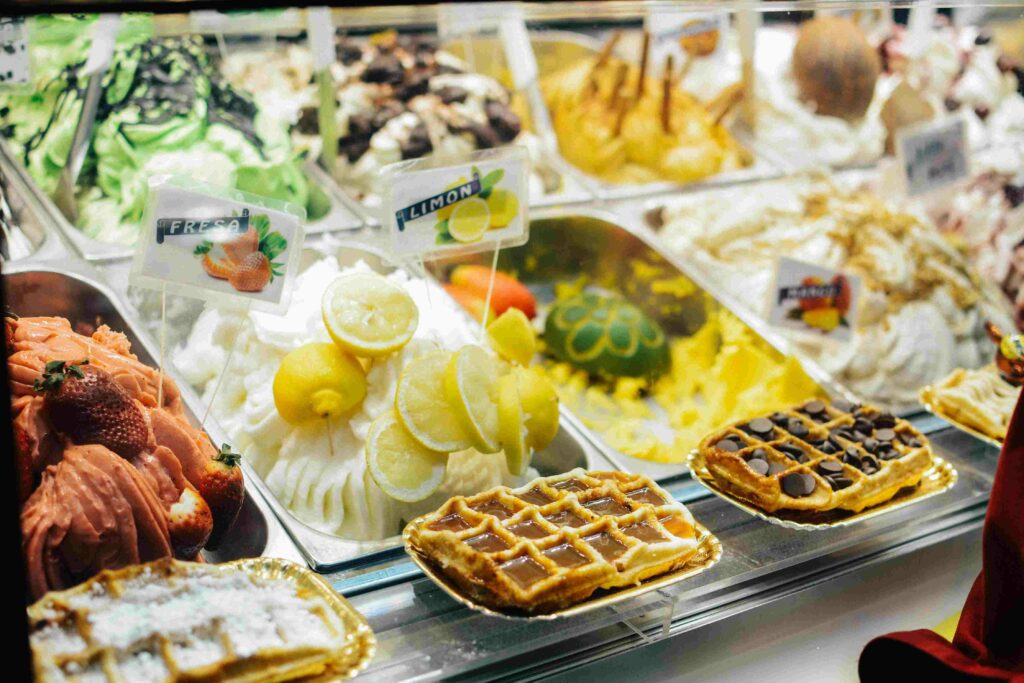
Création d'une identité de marque mémorable
Votre marque est la façon dont les clients se souviendront de vous. Que vous serviez des tacos ou du fromage grillé gastronomique, Créez une marque unique qui reflète votre nourriture et votre ambiance. Votre logo, couleurs, et la conception globale devrait correspondre à l'expérience que vous souhaitez fournir.
Présence en ligne et marketing des médias sociaux
À l'ère numérique d'aujourd'hui, Avoir une présence en ligne est essentiel. Utilisez les médias sociaux pour montrer votre nourriture, Annoncer les emplacements, et engagez-vous avec vos clients. Publier régulièrement des photos, vidéos, et les mises à jour pour garder votre public accroché.
Marketing d'événements et partenariats
Participer à des événements locaux ou un partenariat avec d'autres entreprises est un excellent moyen de stimuler la visibilité. Recherchez des opportunités pour collaborer avec les festivals alimentaires ou les événements locaux où votre marché cible sera.
Configuration de vos finances
Ouverture d'un compte bancaire d'entreprise
Séparez vos finances d'entreprise de vos personnes personnelles. Ouvrez un compte bancaire d'entreprise pour vous aider à suivre vos revenus, dépenses, et taxes. Cela facilitera la gestion de votre entreprise alimentaire mobile à long terme.
Essential de comptabilité et de comptabilité
Une bonne comptabilité garantit que vous savez où va votre argent. Embaucher un comptable ou utiliser un logiciel pour suivre vos revenus, dépenses, et taxes. Rester au top de vos finances vous aide à repérer les problèmes potentiels avant de devenir des problèmes majeurs.
Configuration des systèmes de paiement
Faciliter les clients de vous payer. Si c'est de l'argent, carte, ou paiement mobile, La configuration de plusieurs options de paiement est cruciale pour maximiser les ventes.
Couverture d'assurance et de responsabilité

Types d'assurance pour les entreprises alimentaires mobiles
Un plan d'assurance solide protège votre entreprise contre des situations inattendues. Cela inclut l'assurance véhicule, responsabilité générale, et couverture des dommages ou accidents. Assurez-vous que vous êtes entièrement couvert pour tout incident qui pourrait survenir.
Comprendre l'indemnisation des travailleurs
Si vous embauchez des employés, L'assurance contre les accidents du travail est un must. Il garantit que vos employés sont couverts en cas de blessure tout en travaillant dans votre cuisine mobile.
Gestion des opérations et de la logistique
Planification des voies et des emplacements
Choisissez les bons itinéraires et emplacements pour une exposition maximale. Suivez les préférences des clients et installez-vous dans des zones à fort trafic où votre marché cible se rassemble. La flexibilité et la planification stratégique sont essentielles.
Planification et gestion du temps
Gérez votre horaire efficacement pour tirer le meilleur parti de chaque jour. La gestion du temps aide à vous assurer de pouvoir servir le plus de clients en moins de temps.
Entretien et réparations de l'équipement
Votre équipement aura besoin d'une entretien régulier pour s'assurer qu'elle fonctionne bien. Les contrôles réguliers et les réparations en temps opportun empêchent les temps d'arrêt et permettent à votre entreprise de fonctionner sans accrocs.
Prix de votre menu et gestion des coûts
Fixer des prix rentables
Assurez-vous que les prix de votre menu sont compétitifs tout en laissant de la place à but lucratif. Considérez les coûts alimentaires, temps de préparation, et la demande du marché lors de la fixation des prix.
Calcul des coûts d'exploitation et des marges bénéficiaires
Connaissez vos coûts d'exploitation, y compris la nourriture, travail, et l'entretien des véhicules. Définir une marge bénéficiaire cible, et assurez-vous que votre La remorque alimentaire est rentable.
Gérer les flux de trésorerie
Gardez un œil sur vos flux de trésorerie pour éviter les surprises. La gestion de vos finances garantit efficacement que vous pouvez couvrir les dépenses et réinvestir dans votre entreprise.
Conclusion
Démarrer une entreprise alimentaire mobile ne consiste pas seulement à cuisiner en déplacement. Il s'agit de planifier, Gestion des finances, Et faire des choix intelligents en ce qui concerne l'équipement, fournisseurs, et marketing. La route vers le succès nécessite une réflexion et une exécution minutieuses, Mais avec la bonne préparation, Cela peut être incroyablement enrichissant. Donc, De quoi avez-vous besoin pour démarrer une entreprise alimentaire mobile? C'est un mélange du bon véhicule, permettre, Un menu solide, et, bien sûr, La passion pour le faire fonctionner.
FAQ
1. Combien cela coûte-t-il pour démarrer une entreprise de nourriture mobile?
Les coûts peuvent varier considérablement en fonction de votre concept alimentaire et du type de véhicule que vous choisissez. Attendez-vous à dépenser de $20,000 à $100,000 ou plus sur un camion de restauration ou une remorque.
2. Ai-je besoin d'une licence spéciale pour une remorque alimentaire?
Oui, Vous aurez besoin d'une licence de remorque alimentaire mobile, Ce qui varie en fonction de votre emplacement. Vérifiez avec les services de santé locaux et les conseils de zonage pour des exigences spécifiques.
3. Puis-je financer ma bande-annonce de nourriture?
Oui, De nombreux prêteurs offrent des options de financement pour les camions de restauration et les remorques. Vous pouvez également explorer la location ou l'achat de remorques d'occasion pour réduire les coûts de démarrage.
4. Que dois-je inclure dans mon menu de remorque mobile?
Gardez votre menu simple mais attrayant. Concentrez-vous sur quelques plats de signature qui peuvent être préparés rapidement et facilement dans votre cuisine mobile.
5. Comment puis-je commercialiser mon entreprise de nourriture mobile?
Utilisez des plateformes de médias sociaux pour publier des mises à jour, s'engager avec les clients, et partagez votre emplacement. Participer à des événements locaux et collaborer avec d'autres entreprises peut également aider à développer votre marque.

